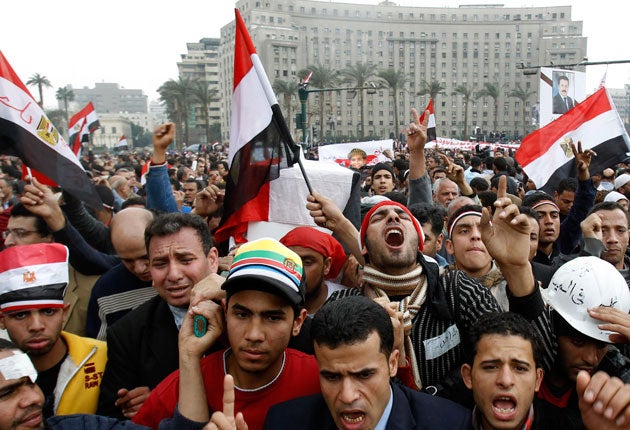Allegiances are rewritten on the pages of an old Mubarak ally

Your support helps us to tell the story
From reproductive rights to climate change to Big Tech, The Independent is on the ground when the story is developing. Whether it's investigating the financials of Elon Musk's pro-Trump PAC or producing our latest documentary, 'The A Word', which shines a light on the American women fighting for reproductive rights, we know how important it is to parse out the facts from the messaging.
At such a critical moment in US history, we need reporters on the ground. Your donation allows us to keep sending journalists to speak to both sides of the story.
The Independent is trusted by Americans across the entire political spectrum. And unlike many other quality news outlets, we choose not to lock Americans out of our reporting and analysis with paywalls. We believe quality journalism should be available to everyone, paid for by those who can afford it.
Your support makes all the difference.Emotions were always going to run high when journalists gathered to march in memory of Ahmed Mohammed Mahmoud, a colleague shot dead through his right eye as he used his mobile phone from a window to photograph police beating – and by some accounts shooting at – anti-Mubarak demonstrators.
But when the chairman of the official journalists' syndicate, commentator Makram Mohamed Ahmed, widely regarded as a Mubarak loyalist, decided to attend a pre-march press conference yesterday, the mourners erupted in angry shouts of "killer". They surrounded him amid chants of "Down with Makram and down with state media", "The mouthpiece of the regime must fall" and – by a few – "you are an agent of America and Israel".
The protest came amid signs of a sudden shift of tone in the editorial line of the influential and government-controlled Al-Ahram, which dates from the 19th century and bills itself as Egypt's oldest newspaper. A column by its normally ultra-loyalist chief editor Osama Soraya cautiously praised the "nobility" of youth leading the pro-democracy "revolution", while advocating restraint on all sides.
Manal Agrama of government-owned Radio and TV Magazine, who walked out at the start of the protests in disgust at the propagandist line taken by official papers and TV, said her colleagues were particularly incensed by Ahmed's observation in a column that "if people want to burn themselves let them do so".
Agrama, who has joined the Tahrir Square protests every day since they began, explained that she had had no calls from her boss, editor Yasser Rizk, since leaving her office and added: "He knows I am not with them." Rizk has been a frequent broadcaster on state TV in the last fortnight, heavily championing Mr Mubarak's continued presidency.
In what seemed like a media micro-revolution, the journalist numbers swelled to several hundred as they marched down Cairo's Talaat Harb Street towards Tahrir Square in a mock funeral procession. They were joined by the late Mr Mahmoud's widow and carried a coffin draped in the Egyptian flag. This time they were chanting the familiar: "Fall, Fall, Hosni Mubarak."
It was a protest which would have been inconceivable before the protests began and still carried the risk of attack by pro-Mubarak supporters. But as it snaked down the street watched by bystanders, some impassive, others muttering Shaheed, or "Martyr"; and by two armed state security men in balaclavas who took no steps to intervene. Only one man pointed at the marchers and declared: "They are all donkeys."
One of the organisers was Al Ahram journalist Karem Yehia, who said he had been banned from writing for the paper for the past two years for taking a critical line. He said seven witnesses had seen Mr Mahmoud shot by a uniformed police marksman at his office at the weekly Al Ta'awen. The journalist was shot on 29 January and died of his wounds on 4 February.
Much of the talk at the syndicate office yesterday was about the apparently emollient approach to the pro-democracy demonstrators in Soraya's front page column in Al-Ahram. Soraya became better known internationally when his paper published a doctored photograph showing President Mubarak striding ahead of President Barack Obama on a red carpet at the White House Middle East summit last September. The editor subsequently defended the "expressionist" use of the picture.
Soraya wrote under the headline "Revolution of the Mind" that "we have to admit the nobility" of the protesters but also insisted protests over the past few years had coincided with a loosening on freedom of expression by the regime. He warned: "Egyptian maturity must rule and direct the new generation of revolutionaries."
But he also declared that the state and its institutions "must rein themselves in and understand the actions of those young people and the dreams of the nation."
Join our commenting forum
Join thought-provoking conversations, follow other Independent readers and see their replies
Comments